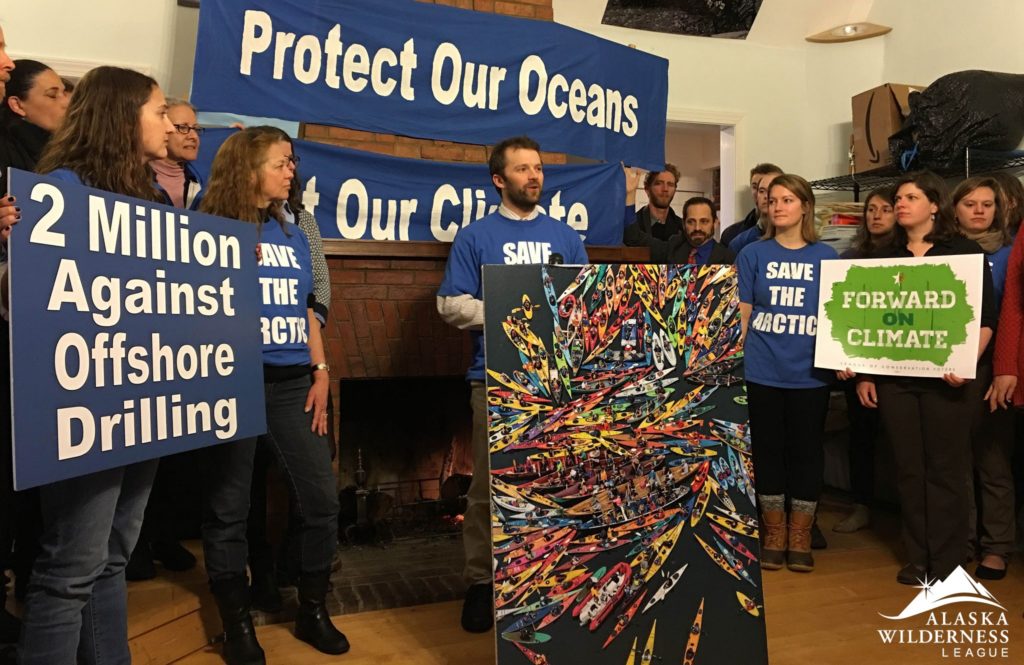Two Million And Counting Against Offshore Drilling

Last week, members of the U.S. Senate pressed President Obama to strengthen his commitment to act on climate change by dropping all new fossil fuel leases from America’s 5-year ocean leasing program. And in that spirit, I was proud to join with folks from the Arctic, Atlantic and Gulf last week as we delivered more than two million signatures from people across the country calling for an end to offshore drilling.
Across the Arctic, sea ice continues to decline, sea levels continue to rise, and local communities and wildlife alike are being stretched to the limit by climate change. But together we can protect it.
I’ve been fortunate to call Alaska home my entire life. I owe this to my parents, who were each drawn to Alaska separately four decades ago. They met on a mountain climb, and ever since they’ve found adventure and opportunity alike in the last frontier. I too have found both in Alaska.
Some of the first adventures that I can remember took place twenty-five years ago, on a snow covered trail in the outskirts of Anchorage. Each weekend in January I’d race two of our family’s sled dogs – Morgan and Moxie – on a three-mile loop, crossing frozen rivers and winding through trees. Ten years later, in 2001, I embarked on a trip of a lifetime, competing in the 1,100 mile Iditarod Sled Dog Race. Starting in Anchorage with a team of sixteen dogs, we crossed the Alaska Range, worked our way up the Yukon River, ran on the frozen Bering Sea ice and reached the finish line in Nome.
A lot has changed since then. The two-dog races of my childhood are increasingly being canceled – the snowpack is too thin. Of the fourteen Iditarod races that have been held since 2001, twice the race start was moved 300 miles north of Anchorage, to a place with more snow. And just two weeks ago in the mountains south of town, I saw buds emerging on the ends of tree branches; the leaves were thinking of coming out. In January. In Alaska.
Those small examples from the past three decades are the just the tip of the iceberg. For some, the changes are severe and dangerous. We have all seen photos of villages along Alaska’s Arctic coast falling into the sea, the result of climate change as water levels rise and permafrost melts. The Arctic is warming twice as fast as the rest of the planet. Since 1949, the average winter temperature in Anchorage has increased by 5.5 degrees.
With all these changes happening, the time to act has arrived (if it hasn’t passed us already). If we don’t like what we are seeing, we need to change what we are doing. We need to take action today.
Drilling in the Arctic Ocean cannot proceed if we want to leave a healthy, vibrant Alaska – or planet, for that matter – as our legacy, our intentional act for future generations.
If we are serious about addressing climate change, we can’t drill in the Arctic Ocean. President Obama saw first-hand the impacts facing Alaskans when he visited this past summer. The United States is talking about leading by example and the Paris climate talks are a perfect example. But meeting the Paris pledge to limit warming to 2 degrees Celsius or less would require keeping 80 percent of the world’s remaining fossil fuels underground, and that means we simply can’t afford to drill in the Arctic Ocean.
Additionally, the risks of an oil spill are simply too high. We’ve seen things go wrong before, in Alaska and around the country. In 1989, the Exxon Valdez ran aground in Prince William Sound and the effects are still being felt throughout the Gulf of Alaska. And just six short years ago, the Deepwater Horizon blowout resulted in millions of barrels of oil bring released into the Gulf of Mexico. Today it remains the largest marine oil spill in the history of the oil industry.
So how likely is a spill in the Arctic Ocean? The government’s own analysis predicts a 75 percent chance of a large oil spill if drilling there moves forward. A large spill isn’t a possibility, it’s an eventuality.
An oil spill in the Arctic Ocean threatens one of the longest and richest of Alaska traditions – the ability of people to live off the land and sea. Tens of thousands of Alaskans still live subsistence lifestyles, taking the food they need from their surroundings. I may not be a subsistence user, but I want to live in a state where these cultures and traditions can continue. And I’m not comfortable taking away traditions that date back thousands of years, just for a few short term gains.
We owe it to future Alaskans – and people around the globe for that matter – to carefully consider the long term impacts of the decisions we make today. With that approach, it becomes clear. Drilling in the Arctic Ocean shouldn’t move forward.
Tell your Senator to cosponsor the Stop Arctic Ocean Drilling Act!

